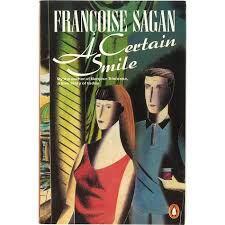A Certain Smile, by Françoise Sagan and translated by Irene Ash
A while back now I read and loved Françoise Sagan’s Bonjour Tristesse. Come the searing summer heat of 2018 and it seemed a good time to return to Sagan.

A Certain Smile is the story of Dominique, an attractive young law student, and her affair with an older man Luc. Dominique already has a boyfriend, the perfectly likeable Bertrand. Luc is married to a kind and generous woman, Françoise. The story is entirely, and intentionally, unoriginal. Here’s the opening paragraph:
We had spent the afternoon in a café in the Rue Saint-Jacques, a spring afternoon like any other. I was slightly bored, and walked up and down between the juke-box and the window, while Bertrand talked about Spire’s lecture. I was leaning on the machine, watching the record rising slowly, almost gently, like a proffered cheek, to its slanting position against the sapphire, when, for no apparent reason, I was overcome by a feeling of intense happiness, a sudden realization that some day I would die, that my hand would no longer touch that chromium rim, nor would the sun shine in my eyes.
There’s a lot packed in there. The narrator, who we’re yet to learn is named Dominique, is “slightly bored”. That will matter, because the story is in part driven by her desire to alleviate that casual boredom.
The language is deeply sensual. The record rises “like a proffered cheek”, already introducing a hint of sex, but it’s not just that. The whole description of something as mundane as playing a record on a jukebox is suffused with languorous desire.
Suddenly the narrator is overcome by “intense happiness”, but it’s irrevocably linked to mortality and to her realisation that one day she won’t be there to experience moments like this. She isn’t happy despite the prospect of death. The happiness is born of the joy of the moment and her awareness of its transience.
In a sense the whole book is there, and for that I think it’s a pretty much perfect opening paragraph. Soon we learn that the narrator is Dominique and that she’s a law student and that it’s summer, but from these opening words we already know much more profound things about her than those quotidian facts.
Dominique and Bertrand make a good couple. They laugh together, make love, care about each other. Still, he’s her first serious boyfriend and for most people those first relationships tend not to last. Even had Bertrand not introduced Dominique to his uncle, Luc, there would always eventually have been a Luc of one sort or another.
Luc and Françoise are older, already settled in life and with each other. They have no children and Françoise becomes almost a proxy-mother to Dominique, buying her clothes and feeding her dinners. Luc takes a different sort of interest.
Dominique is flattered by his attention and more by the frank way in which he tells her he wants to sleep with her but that he will never love her and this will be just a pleasant interlude in their lives. He makes her feel grown up, adult, knowing. She believes she can be like him, dispassionately passionate. She ignores the signs that she’s wrong:
Already there was something that seemed to race like a hurricane when Luc was there. Afterwards time suddenly dropped back to normal, and once more there were minutes, hours, and cigarettes.
Plotwise I don’t have much more to say. Luc takes Dominique to the French Riviera for a few days in a nice hotel with a sea view. It’s almost like he’s done this before…
Of course, things aren’t quite as simple as Dominique expects. People get hurt, including her. As I said at the outset, in terms of story this is intentionally unoriginal.
So why read it? Partly because Sagan is so good on the experience of being Dominique: on her evolving and conflicting feelings; her discovery of love and her worse discovery of unreciprocated love; the sheer pleasure of being young and alive. Nothing Dominique experiences is new, except to her which is all that truly matters.
Sagan writes with extraordinary clarity. Just look at that first paragraph again: it’s luminous. The whole book is like that, but at the same time it’s succinct with no wasted or unnecessary detail. Reading it I could picture every scene, but when I looked back on it prior to writing this I realised that Sagan achieves that impact often with only the barest of descriptions.
Sagan can also be very funny when she feels like it and seemingly effortlessly cool. The book is full of small sly asides (the cigarettes line above is a great example). Here’s one final quote that I just couldn’t resist including:
I was back in the Champs-Élysées with the taste of a strange mouth on my lips, and I decided to go home and read a new novel.
It seems a sensible response.
Other reviews
I wrote a little about this in my June roundup here. Otherwise, two reviews that I particularly want to note. The first is this great review by Jacqui at Jacqui Wine’s Journal. Rereading it I see that Jacqui used exactly the same phrase as I did to describe Françoise – “kind and generous”. Clearly Sagan painted the character clearly.
The second, here, is a contemporaneous review by The Spectator. I don’t usually include non-blog reviews, but I think it’s pretty much spot on and it’s interesting to see one which treats this as a new novel by a young writer rather than an old novel by a famous name.
